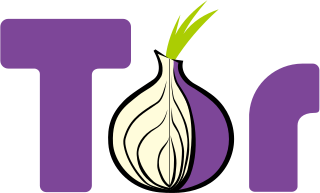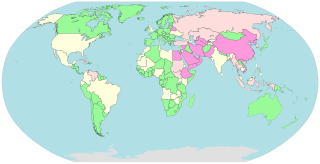China censors both the publishing and viewing of online material. Many controversial events are censored from news coverage, preventing many Chinese citizens from knowing about the actions of their government, and severely restricting freedom of the press. China's censorship includes the complete blockage of various websites, apps, video games, inspiring the policy's nickname, the "Great Firewall of China", which blocks websites. Methods used to block websites and pages include DNS spoofing, blocking access to IP addresses, analyzing and filtering URLs, packet inspection, and resetting connections.
The Great Firewall is the combination of legislative actions and technologies enforced by the People's Republic of China to regulate the Internet domestically. Its role in internet censorship in China is to block access to selected foreign websites and to slow down cross-border internet traffic. The Great Firewall operates by checking transmission control protocol (TCP) packets for keywords or sensitive words. If the keywords or sensitive words appear in the TCP packets, access will be closed. If one link is closed, more links from the same machine will be blocked by the Great Firewall. The effect includes: limiting access to foreign information sources, blocking foreign internet tools and mobile apps, and requiring foreign companies to adapt to domestic regulations.
Internet censorship in Tunisia significantly decreased in January 2011, following the ouster of President Zine El Abidine Ben Ali, as the new acting government removed filters on social networking sites such as YouTube.

Internet censorship is the legal control or suppression of what can be accessed, published, or viewed on the Internet. Censorship is most often applied to specific internet domains but exceptionally may extend to all Internet resources located outside the jurisdiction of the censoring state. Internet censorship may also put restrictions on what information can be made internet accessible. Organizations providing internet access – such as schools and libraries – may choose to preclude access to material that they consider undesirable, offensive, age-inappropriate or even illegal, and regard this as ethical behavior rather than censorship. Individuals and organizations may engage in self-censorship of material they publish, for moral, religious, or business reasons, to conform to societal norms, political views, due to intimidation, or out of fear of legal or other consequences.
Most Internet censorship in Thailand prior to the September 2006 military coup d'état was focused on blocking pornographic websites. The following years have seen a constant stream of sometimes violent protests, regional unrest, emergency decrees, a new cybercrimes law, and an updated Internal Security Act. Year by year Internet censorship has grown, with its focus shifting to lèse majesté, national security, and political issues. By 2010, estimates put the number of websites blocked at over 110,000. In December 2011, a dedicated government operation, the Cyber Security Operation Center, was opened. Between its opening and March 2014, the Center told ISPs to block 22,599 URLs.
The Internet is accessible to the majority of the population in Egypt, whether via smartphones, internet cafes, or home connections. Broadband Internet access via VDSL is widely available. Under the rule of Hosni Mubarak, Internet censorship and surveillance were severe, culminating in a total shutdown of the Internet in Egypt during the 2011 Revolution. Although Internet access was restored following Mubarak's order, government censorship and surveillance have increased since the 2013 coup d'état, leading the NGO Freedom House to downgrade Egypt's Internet freedom from "partly free" in 2011 to "not free" in 2015, which it has retained in subsequent reports including the most recent in 2021. The el-Sisi regime has ramped up online censorship in Egypt. The regime heavily censors online news websites, which has prompted the closure of many independent news outlets in Egypt.
In Ethiopia, the Internet penetration rate is 25% as of January 2022, and it is currently attempting a broad expansion of access throughout the country. These efforts have been hampered by the largely rural makeup of the Ethiopian population and the government's refusal to permit any privatization of the telecommunications market. Only 360,000 people had Internet access in 2008, a penetration rate of 0.4%. The state-owned Ethio Telecom is the sole Internet service provider (ISP) in the country. Ethio Telecom comes in at very high prices which makes it difficult for private users to purchase it.
The Cuban government directly prevents access to certain websites. While preventing access to certain websites is present, it is not particularly extensive. Limited access to the Internet through limited internet infrastructure is the main problem with Internet access in Cuba.
Communications in the State of Palestine occur across many media, including telephone, radio, television, and internet. The telecom infrastructure is growing at a very rapid pace and continually being updated and expanded.

An Internet outage or Internet blackout or Internet shutdown is the complete or partial failure of the internet services. It can occur due to censorship, cyberattacks, disasters, police or security services actions or errors.
This list of Internet censorship and surveillance by country provides information on the types and levels of Internet censorship and surveillance that is occurring in countries around the world.

UltraSurf is a freeware Internet censorship circumvention product created by UltraReach Internet Corporation. The software bypasses Internet censorship and firewalls using an HTTP proxy server, and employs encryption protocols for privacy.
Internet censorship circumvention, also referred to as going over the wall or scientific browsing in China, is the use of various methods and tools to bypass internet censorship.

In Russia, internet censorship is enforced on the basis of several laws and through several mechanisms. Since 2012, Russia maintains a centralized internet blacklist maintained by the Federal Service for Supervision of Communications, Information Technology and Mass Media (Roskomnadzor).

The Tor Project, Inc. is a 501(c)(3) research-education nonprofit organization based in Winchester, New Hampshire. It is founded by computer scientists Roger Dingledine, Nick Mathewson, and five others. The Tor Project is primarily responsible for maintaining software for the Tor anonymity network.

Domain fronting is a technique for Internet censorship circumvention that uses different domain names in different communication layers of an HTTPS connection to discreetly connect to a different target domain than is discernable to third parties monitoring the requests and connections.

This list of Internet censorship and surveillance in Oceania provides information on the types and levels of Internet censorship and surveillance that is occurring in countries in Oceania.
The 2019 Internet blackout in Iran was a week-long total shutdown of the Internet. It was ordered by the Supreme National Security Council and imposed by the Ministry of ICT. The blackout was one of the Iranian government's efforts to suppress the 2019–2020 protests. During the blackout, Iranian citizens could only access the National Information Network. Mohammad-Javad Jahromi was sanctioned by the United States Department of the Treasury because of his role in Internet censorship in Iran.

Snowflake is a software package for assisting others in circumventing internet censorship by relaying data requests. Snowflake relay nodes are meant to be created by people in countries where Tor and Snowflake are not blocked. People under censorship then use a Snowflake client, packaged with the Tor Browser or Onion Browser, to access the Tor network, using Snowflake relays as proxy servers. Access to the Tor network can in turn give access to other blocked services. A Snowflake node can be created by either installing a browser extension, installing a stand-alone program, or browsing a webpage with an embedded Snowflake relay. The node runs whenever the browser or program is connected to the internet.











